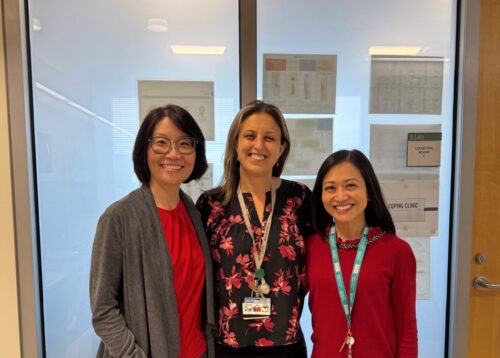Busting 4 Myths About Supporting a Family Member in Addiction Recovery
April 4, 2023
By Meryl Bailey

Hello Africa, Getty Images
Concepts like "tough love" and "codependency" are among many myths around family support that can hinder a loved one's recovery from addiction.
For chronic diseases such as diabetes, heart disease, and cancer — experts acknowledge the vital role caregivers play in helping with disease management, as well as in alleviating daily burdens for their loved ones. Strong social support from patients’ relatives, partners, and friends is critical to successful treatment plans. Studies find that compassionate, action-oriented support from family helps patients reduce stress and live longer.
In striking contrast, families and loved ones of people with substance use disorder (SUD) often receive mixed messages from society and the healthcare system about their role as caregivers. Longstanding myths and outdated language, such as “codependency” and “tough love,” can harm family members and loved ones in treatment and addiction recovery.
“Often we don’t talk about the language that stigmatizes and pathologizes family members and the damaging impact that not only the language, but the ideas behind the language, have on patient outcomes,” says Alicia Ventura, MPH, director of special projects and research for the Grayken Center for Addiction Training and Technical Assistance (TTA) program at Boston Medical Center (BMC). These myths are not just perpetuated among friends and neighbors, she explains, but also within the medical community.
Reframing the role of social support in addiction recovery and treatment among clinicians is a critical step toward improving health outcomes for patients with SUD. In less than a year, Grayken’s TTA program has trained over 1,000 healthcare professionals nationwide about the importance of including family and social support in current models of care. They’ve encouraged clinicians to engage and educate patient families when possible, while working to dispel these common myths that perpetuate stigma around addiction.
Myth #1: Family is responsible for causing or perpetuating addiction.
Clinicians are in a challenging position when patients with SUD present to care. They often hear stories from patients of misinformed families who withdraw support. Conversely, the bunk term “codependency” conjures up family members who pander to their loved one’s self-destructive behavior in order to keep them emotionally close. Because of this, some clinicians have a misinformed view of “toxic” families and view them as a barrier to successful treatment.
“Clinicians need to understand that families are kind of ‘damned if you do, damned if you don’t,”‘ says Ventura. “The long-standing myth that addiction is a moral failing perpetuates misinformation about how families should best serve their loved ones.”
Data consistently show that positive family support leads to better outcomes in patients. Through the education group “Empowering Loved Ones of People with Addiction,” the Grayken Center uses the latest research to inform family members—biological or chosen—about how to best support their loved ones with SUD. The education group aims to teach skills related to communication, problem-solving in difficult situations, dealing with crises and conflict, setting boundaries, and reducing the stress and strain family members experience.
Amy Yule, MD, vice chair of Addiction Psychiatry at Boston Medical Center, also discourages a myopic view of family support. She urges care providers to continue to reach out to patients to identify their social support system to better identify and integrate potential caregivers into treatment plans.
“Ask your patients, ‘who do you go to for support?’ ‘Who do you consider the most helpful person to you in your life?’ ‘Who are you in contact with the most?'” she says.
Myth #2: Compassionate support is enabling. “Tough love” from close family and friends is the only way someone can fully enter into recovery.
The most damaging language around addiction support describe concepts like “codependency” and “tough love” that encourage isolation of the person using substances.
“Codependency is not a diagnosis. It was rejected from the DSM-III. It’s somewhat bizarre that there has been so much research and effort to justify that codependency is a real disorder,” Ventura explains. “It perpetuates the idea that caring for family is rewarding self-destructive behavior. The term pathologizes kindness and compassion, the things we know can catalyze positive change.”
The term “rock bottom” is also an extremely troubling term, she says, that encourages uninformed caregivers to stay distant, which can further increase the risk of overdose or death. People with SUD benefit from intervention and early treatment. However, counseling families on how to support and care for their loved ones with addiction remains very personal and nuanced.
“I’m often telling parents if there was something I could tell you in two or three sentences, you would’ve already done it. You’ve been thinking so hard about this and trying many different things,” Yule says. “It’s complicated, and it will take some time working with you and making bigger changes to support you in helping your child.”
Myth #3: Families don’t practice harm reduction.
Families can and do practice harm reduction. Support can look different from family to family, and it is essential that clinicians empower family members to support their loved ones in the ways they can. Not every family member can supervise their loved one’s substance use in their home, though some do. Many family members carry naloxone and have reversed overdoses; others provide clean needles.
Myth #4: Evidence-based models are the only way to include family members
Family involvement is a continuum. Clinicians often wrongly assume that to engage families in care, they must adopt and utilize a specific model, which can be costly and demanding on time and staff. While there are effective evidence-based family models of care, such as Community Reinforcement and Family Training(CRAFT) and multi-dimensional family therapy, providers can engage families in many ways that are helpful to both themselves and their loved ones with SUD. Engagement can also include:
- Letting family members call to schedule initial visits.
- Encouraging family involvement or other social supports.
- Creating packets for families with information on local resources
- Providing education about addiction and medications used to treat addiction
“It’s not that you have to know a specific protocol,” underlines Yule. “It’s reframing your perspective to see this patient as part of a social network and asking how you can do a better job in engaging their social support to improve their care.”
The Grayken Center for Addiction TTA Program created a video to educate clinicians on how longstanding stigma and misinformation impacts caregivers of people with substance use disorder and their loved ones.
When involving family in a loved one’s addiction care, providers should be sensitive that family members also suffer from harm related to drug use. They are at a higher risk of developing chronic and psychiatric conditions. So, it is important to engage families with compassion and empathy, while providing evidence-based guidance and resources to help families cope with the stress of caregiving. Improved health and functioning of family members can be a strong motivator of change for someone with substance use disorder.
To improve care, the Grayken Center for Addiction Family Focused Forum meets quarterly to strengthen communication and coordination between programs at BMC that care for families impacted by substance use disorders.


